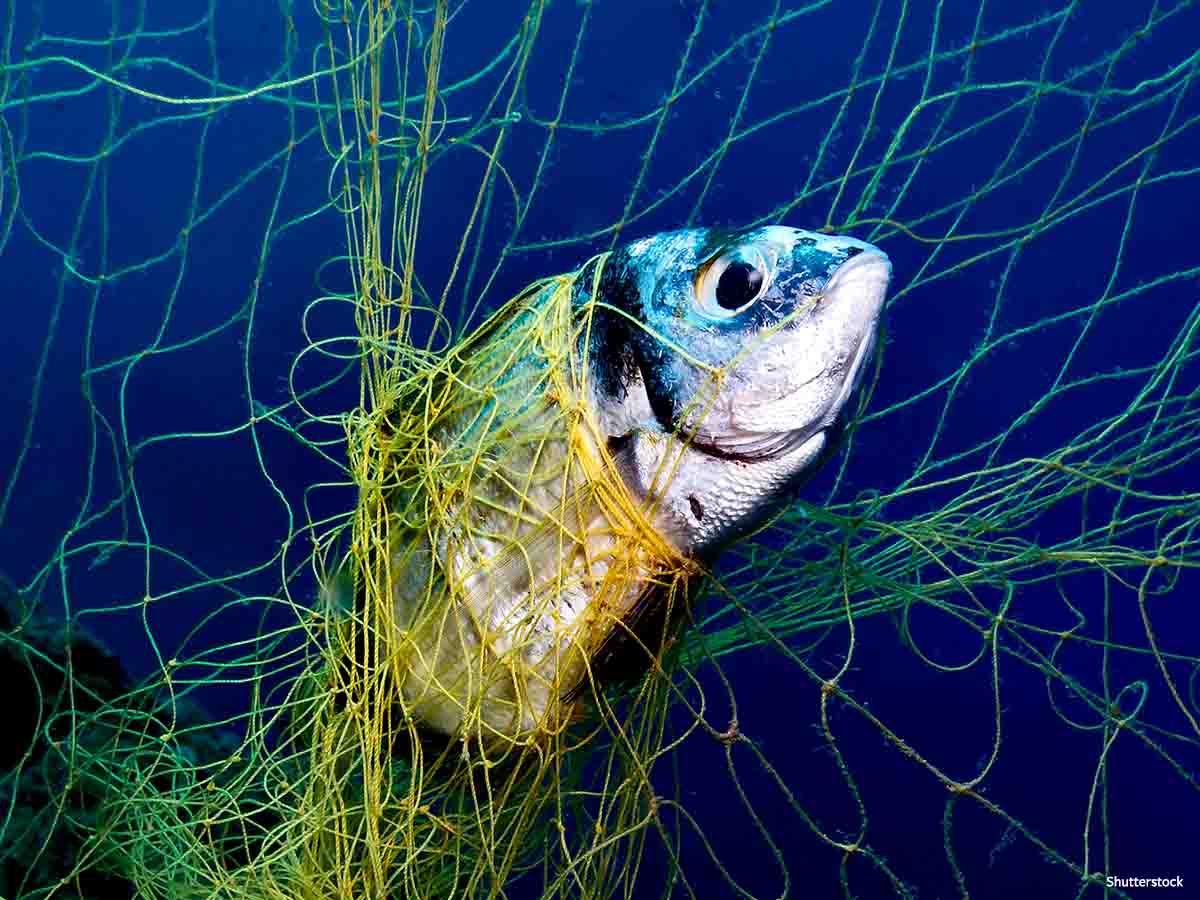MEDIA RELEASE: August 1 is Respect for Fish Day: Dangers of Ghost Gear Highlighted
SAN RAFAEL, Calif. (July 25, 2022) — More than 250 organizations are joining In Defense of Animals on August 1 to celebrate the third annual Respect for Fish Day. The awareness day highlights the issues fish face and spreads compassion for them. This year’s focus is the harmful impact of fishing and ghost gear on fish and other wild animals who share their aquatic habitats and the environment.
Watch the video: https://youtu.be/kRBqifkwEFw
Derelict fishing gear, known as “ghost gear,” is one of the most harmful forms of marine debris and is devastating the health of marine species and ecosystems. Ghost gear consists of fishing lines, lures, nets, ropes, traps, and other fishing items that get lost or left behind. This gear is typically made of long-lasting synthetic materials or metal that remain in the environment for years. In the case of plastic equipment, when it eventually does break down, it turns into microplastics.
Current estimates on the total amount of ghost gear in the environment vary widely. However, there is consensus that it is a severe problem and likely to be a significant source of ocean plastic pollution. The Food and Agriculture Organization of the United Nations is studying global gear loss rates to determine the amount, but it will be several years before it’s finished.
Ghost gear’s deadly effects are caused by recreational and commercial fishing in small waterways to oceans where it impacts hundreds of species both in and out of the water. Sea turtles, birds, whales, and many other animals, including threatened and endangered species, become entangled, injured, and suffer slow and painful deaths, typically from suffocation or starvation. Even recreational catch-and-release fishing causes immense harm to fish physiologically, which often leads to their death after release.
“We deeply appreciate people wanting to escape into nature and enjoy outdoor activities, but fishing is causing immense harm to fish, wildlife and ecosystems,” said Julie Massa, Wild Animals Campaigner for In Defense of Animals. “We hope Respect for Fish Day inspires more people to rethink fishing and consuming fish, and consider how these actions affect these incredible animals and the environments they live in. Whales, turtles, birds, and other animals tangled in lost fishing gear serve as an urgent call to action to end fishing which is emptying the oceans of fish and wildlife. We also aim to call attention to fishing derbies which condition children to inflict harm upon vulnerable animals and to encourage participation in harm-free activities instead.”
Numerous studies have concluded that fish feel pain and emotions. They are also more intelligent than we imagined; fish can learn by imitation, count, remember, recognize group members’ faces, cooperate, and use tools. Despite their considerable capabilities, trillions of fish are killed worldwide every year intentionally and as unintended “bycatch.”
“Although we don’t encounter fish in their underwater ecosystems frequently, or the way we do with land animals, they are some of the most interesting animals on Earth. Fish feel pain and are capable of experiencing emotions. They deserve far more consideration from us than to be killed for food or recreation and entertainment,” said Lisa Levinson, Campaigns Director for In Defense of Animals. “Fishing causes obvious suffering to individual fish while ghost gear maims and kills even more animals, pollutes marine environments, and damages ecosystems for decades. Fishing lines and hooks left along rivers and lakeshores are ingested by ducks or become tangled around their feet, reducing circulation, and causing loss of limbs or even their lives. Wildlife rehabilitators and duck rescues spend thousands of dollars to save individual animals due to ghost gear.”
Many states explicitly exempt fish from being protected by their anti-cruelty laws, or exempt standard fishing practices from compliance with them, despite the pain and suffering they cause. Fish are denied even minor protections under federal law, including the Animal Welfare Act, the Humane Methods of Slaughter Act, and the Preventing Animal Cruelty and Torture Act.
“A lot of time and resources are being put into studying ghost gear, but the problem can be solved today by not consuming fish and other marine animals,” said Fleur Dawes, Communications Director for In Defense of Animals. “Respect for Fish Day is the perfect time to try plant-based alternatives to fish. Choose vegan seafood to save animals, preserve vulnerable species, and protect the environment.”
The ultimate goal of Respect for Fish Day is to encourage people to acknowledge fish as sentient beings deserving of the same compassion, understanding, and protection granted to any other animal. As consumers and citizens, we all have the opportunity to change the world for them.
This year, you can participate in ghost gear cleanups in your community, enjoy activities in nature that don’t cause harm, and access a toolkit with images and a fact sheet to share on social media and in your areas.
Learn more and take action at www.respectforfish.org.
Contact: Julie Massa, Julie@idausa.org, 415-448-0048 x232
In Defense of Animals is an international animal protection organization with over 250,000 supporters and a 39-year history of fighting for animals, people, and the environment through education, campaigns as well as hands-on rescue facilities in India, South Korea, and rural Mississippi. www.idausa.org/fish
### ENDS ###


